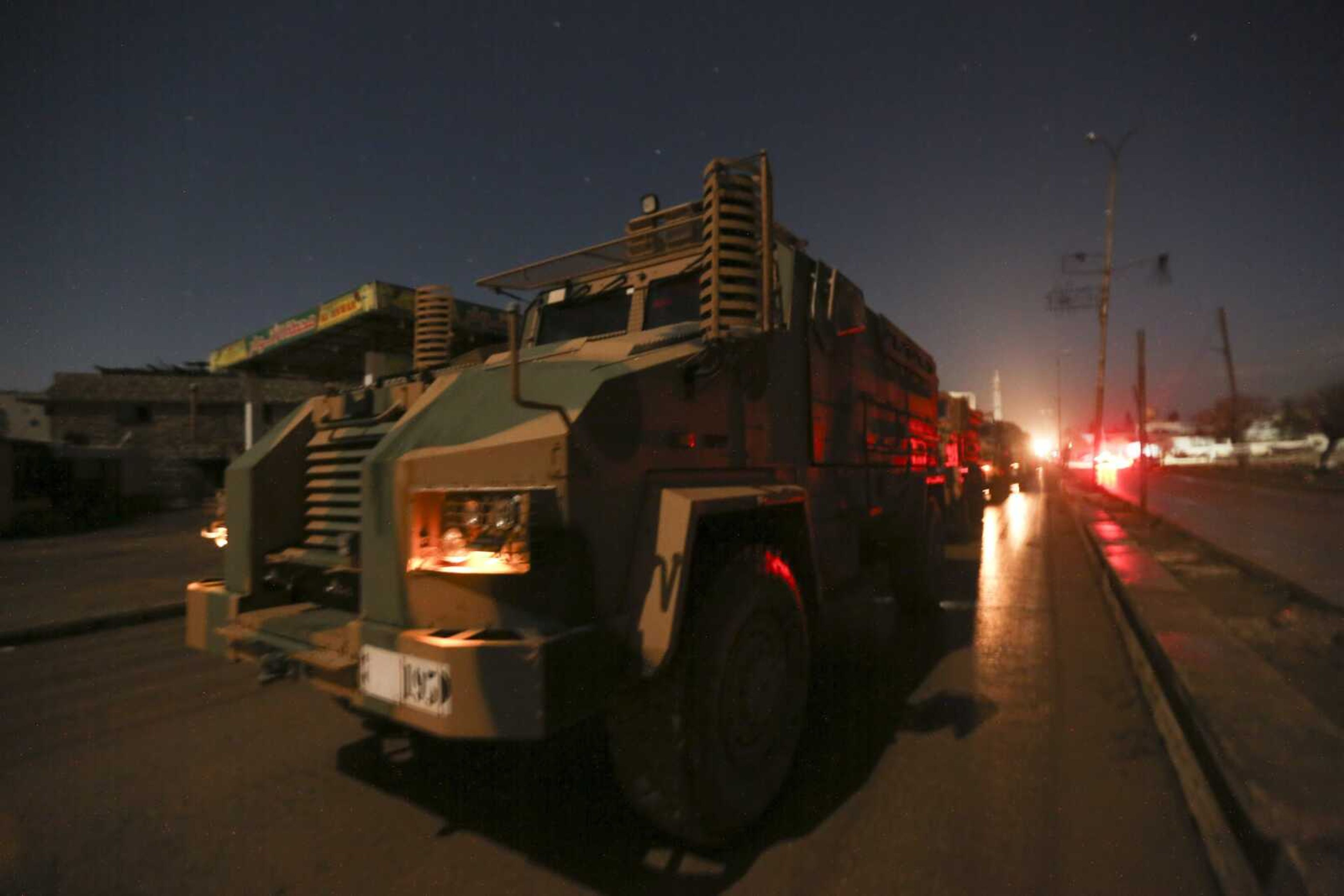Syrian advance sends hundreds of thousands fleeing in Idlib
BEIRUT -- Turkey on Friday sent more troops and tanks to bolster its military presence in northwestern Syria, where President Bashar Assad's forces have been advancing in a devastating, Russian-backed offensive that has sparked a massive wave of people fleeing in wet and blustery winter weather...
BEIRUT -- Turkey on Friday sent more troops and tanks to bolster its military presence in northwestern Syria, where President Bashar Assad's forces have been advancing in a devastating, Russian-backed offensive that has sparked a massive wave of people fleeing in wet and blustery winter weather.
Syria's Idlib region near the border with Turkey is the last rebel-held bastion in the war-ravaged country. The push by Assad's forces into towns and villages in the province over the past months has uprooted more than a half-million people who fled the advancing troops. Many of them already have been displaced several times in the 8-year-old Syrian war.
The campaign also has angered Turkey, which backs the rebels, and brought the two countries' troops into a rare, direct confrontation: At least eight Turkish troops and civilians and 13 Syrian soldiers have been killed.
As Syrian and Russian warplanes indiscriminately pounded hospitals, clinics and schools in the enclave, civilians packed their belongings in cars, taxis and pickup trucks. They streamed toward the Turkish border with few options left that are outside Syrian government control.
Many end up in tents or sheltering in abandoned buildings during rainy and windy weather, with temperatures hovering around freezing but predicted to fall over the weekend.
"If they stay, they run the risk of falling victim to the indiscriminate violence taking place in urban areas. If they leave, they have nowhere to go, " said Lorenzo Redalie, head of the Aleppo office of the International Committee of the Red Cross. "The shelters can't accommodate everyone, and it is more and more challenging for humanitarians to reach them and meet their needs."
The Syrian offensive appears aimed for now at securing a strategic highway in rebel-controlled territory, as opposed to an all-out campaign to retake the entire province, including the city of Idlib, the densely populated provincial capital.
Earlier this week, Syrian government troops took control of the former rebel town of Saraqeb, which is strategic because it sits on the intersection of two major highways. One of them leads to the capital, Damascus, to the north, and another connects to the country's western and eastern regions.
Turkey, which backs the Syrian opposition and has been monitoring a cease-fire in the rebel enclave, has protested the government assault, calling it a violation of the truce it negotiated with Russia. In recent weeks, Ankara sent in troops and equipment to reinforce monitoring points it set up to observe a previous cease-fire, which has since crumbled, and also deployed forces around towns that are threatened by the Syrian advance.
Associated Press video showed a long line of armored vehicles and trucks, some carrying tanks, filing into rebel-controlled rural areas of the province. The Britain-based Syrian Observatory for Human Rights, which monitors the war, said the new troops were deployed west of the town of Saraqeb. It was fifth known deployment of new troops into Syria over the last week, according to the Observatory and other opposition news outlets.
"It is shocking that civilians continue to bear the brunt of hostilities between all parties to the conflict," U.N. Human Rights spokeswoman Marta Hurtado said.
"It appears foreign powers are battling for territorial and political gains, while blatantly disregarding their obligation to protect civilians," she told reporters in Geneva.
Idlib and nearby rural Aleppo are the last rebel-held areas in Syria. They are home to more than 3 million people, most of them already displaced by violence.
Hundreds of thousands of people have been on the move in recent weeks, fleeing toward areas closer to the Turkish border. Many of them are being housed in temporary shelters.
Of the 580,000 people who have been displaced since Dec. 1, UNICEF estimated that about 300,000 of them are children.
Also on Friday, Russia's Defense Ministry accused Israel of nearly shooting down a Syrian passenger jet with 172 people aboard during a missile strike on the suburbs of Damascus a day earlier. A spokesman for the Israeli prime minister did not respond to a request for comment, and the AP was unable to verify the Russian allegation. Israel rarely acknowledges any strikes carried out in Syria.
Turkish officials say three Turkish observation posts are inside Syrian-controlled areas in Idlib. A security official, speaking on condition of anonymity in line with government rules, insisted the posts would not be evacuated.
Turkey's Defense Ministry warned the army would respond "even more forcefully" to any attack on the observation posts, adding: "Our observation posts will continue carrying out duties."
There was a brief respite Friday from the air campaign, residents and opposition activists said, with almost no bombardment reported. It was not clear whether that was due in part to a storm that battered the area with strong winds and heavy rain.
The violence has also raised tensions between Moscow and Ankara, which have been working together to secure cease-fires and political talks despite backing opposite sides of the conflict.
Turkish Foreign Minister Mevlut Cavusoglu said a Russian delegation is scheduled to arrive in Ankara on Saturday to discuss the situation in Idlib. A meeting between Turkish President Recep Tayyip Erdogan and Russian President Vladimir Putin could follow, Cavusoglu said.
"We will do whatever is necessary to stop the human drama, the disaster" in Idlib, Cavusoglu said.
Connect with the Southeast Missourian Newsroom:
For corrections to this story or other insights for the editor, click here. To submit a letter to the editor, click here. To learn about the Southeast Missourian’s AI Policy, click here.









